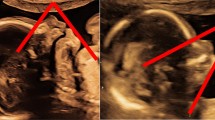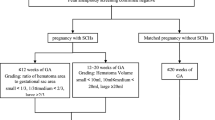Abstract
Aims and Objective
To evaluate the cause of NIHF cases referred to a tertiary referral center and to analyze the outcome.
Materials and Methods
A total of 130 cases of fetal hydrops registered during eight-year study period were reviewed. Antenatal ultrasound, blood investigations and postnatal fetal examination were done, and outcome was noted.
Results
Out of 130 cases of NIHF, antenatal ultrasound showed the presence of structural malformations in 94/130 (72.3%), cardiac abnormality was the most common (34/130, 26.1%) and cystic hygroma was seen in 15/130 (11.5%). Chromosomal abnormality was observed in 15(11.5%) cases, and Doppler US showed anemia in 4/130 (3.1%) cases only. Live born were 25 (12.9%), and rest all were stillborn or abortion. Later mean gestational age of presentation (p = 0.0001), presence of gastrointestinal malformation (p = 0.0001) and absence of structural malformations (p = 0.0441) were factors significantly associated with live birth; the presence of cystic hygroma (p = 0.0431) or structural heart defect (p = 0.007) was significantly associated with poor outcome.
Conclusion
Fetal anemia was not a common cause of NIHF in the study population. The early onset of hydrops and presence of structural malformation carry a graver prognosis; type of structural defect also has bearing on outcome.




Similar content being viewed by others
References
Bellini C, Hennekam RC. Non-immune hydrops fetalis: a short review of etiology and pathophysiology. Am J Med Genet A. 2012;158A:597–605.
Randenberg AL. Nonimmune hydrops fetalis part I: etiology and pathophysiology. Neonatal Netw. 2010;29:281–95.
Bellini C, Donarini G, Paladini D, et al. Etiology of non-immune hydrops fetalis: an update. Am J Med Genet A. 2015;167A(5):1082–8.
Ota S, Sahara J, Mabuchi A, et al. Perinatal and one-year outcomes of non-immune hydrops fetalis by etiology and age at diagnosis. J Obstet Gynaecol Res. 2016;42(4):385–91.
Nadkarni A, Phanasgaonkar S, Colah R, et al. Prevalence and molecular characterization of alpha-thalassemia syndromes among Indians. Genet Test. 2008;12(2):177–80.
Yeom W, Paik ES, An JJ, et al. Clinical characteristics and perinatal outcome of fetal hydrops. Obstet Gynecol Sci. 2015;58(2):90–7.
Bellini C, Hennekam RC, Fulcheri E, et al. Etiology of nonimmune hydrops fetalis: a systematic review. Am J Med Genet A. 2009;149A:844–51.
Society for Maternal-Fetal Medicine (SMFM), Norton ME, Chauhan SP, Dashe JS. Society for maternal-fetal medicine (SMFM) clinical guideline #7: nonimmune hydrops fetalis. Am J Obstet Gynecol. 2015;212(2):127–39.
Huhta JC. Diagnosis and treatment of foetal heart failure: foetal echocardiography and foetal hydrops. Cardiol Young. 2015;25(Suppl 2):100–6.
Randenberg AL. Nonimmune hydrops fetalis part II: does etiology influence mortality? Neonatal Netw. 2010;29:367–80.
Kim SA, Lee SM, Hong JS, et al. Ultrasonographic severity scoring of non-immune hydrops: a predictor of perinatal mortality. J Perinat Med. 2015;43(1):53–9.
Author information
Authors and Affiliations
Corresponding author
Ethics declarations
Conflicts of interest
No conflict of interest among authors.
Human and Animals Rights
Due consents were taken from human participants, and there were no animal participants in the study.
Informed Consent
Informed consent was taken on predetermined proforma.
Additional information
Manisha Kumar is a Professor in Department of Obstetrics & Gynaecology, Lady Hardinge Medical College, New Delhi, India; Vandana Jha is a Senior Resident, Department of Obstetrics and Gynaecology, Lady Hardinge Medical College, New Delhi, India; Anuradha Singh is an Associate Professor, Department of Obstetrics and Gynaecology, Lady Hardinge Medical College, New Delhi, India.
Rights and permissions
About this article
Cite this article
Kumar, M., Jha, V. & Singh, A. Nonimmune Hydrops Fetalis: Factors Which Predict Outcome. J Obstet Gynecol India 68, 197–203 (2018). https://doi.org/10.1007/s13224-017-1011-6
Received:
Accepted:
Published:
Issue Date:
DOI: https://doi.org/10.1007/s13224-017-1011-6




